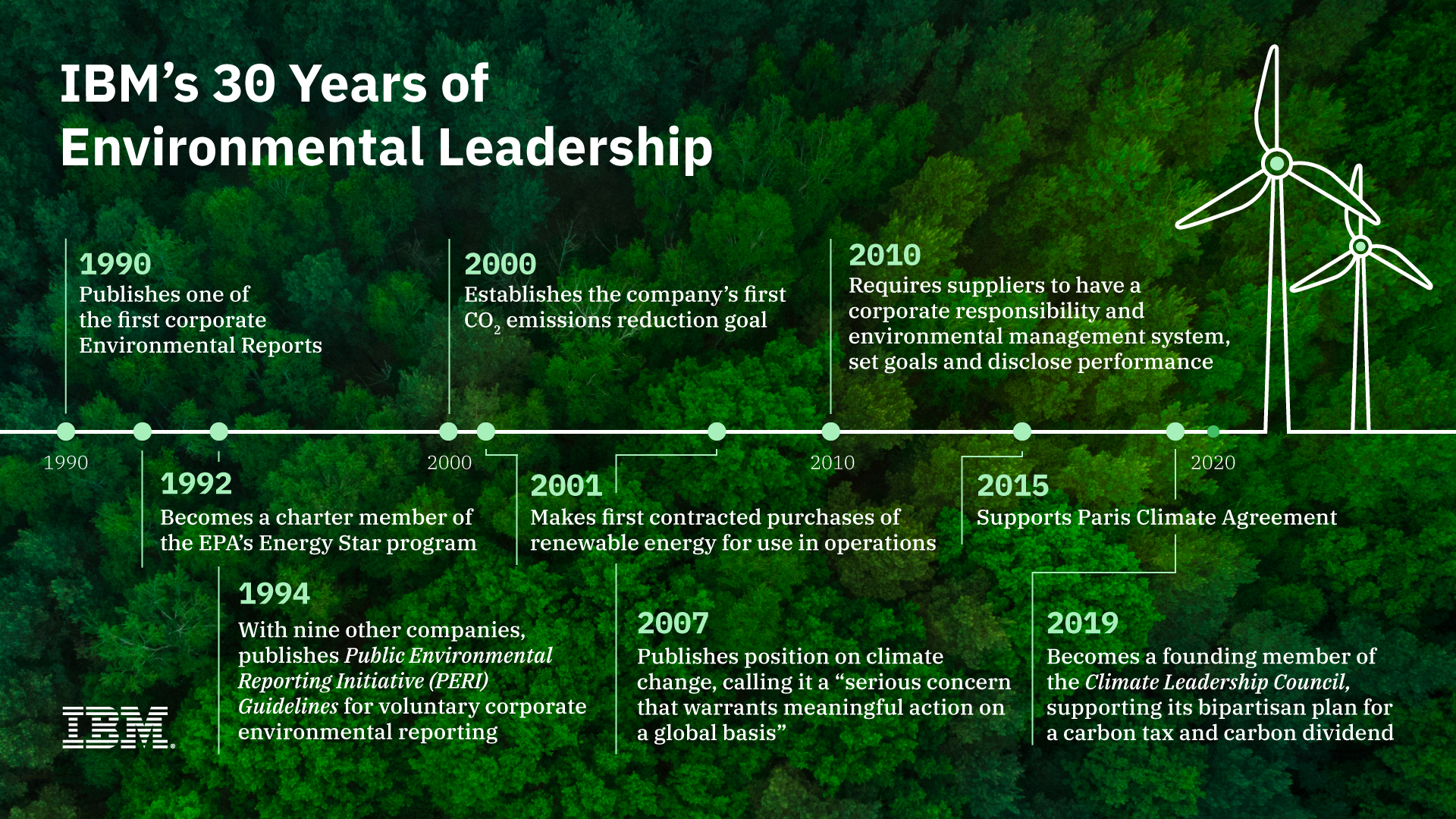Tech For Good
30 Years and Counting: Why IBM’s Environmental Report Matters More Than Ever
July 14, 2020 | Written by: Jim Whitehurst
Categorized: Tech For Good
Share this post:
As we publish the 30th edition of IBM’s annual corporate environmental report, the world is in crisis: we are in the midst of a pandemic, a global economic contraction, and the heartbreaking persistence of racial inequality.
In times like these, it would be easy for business leaders to neglect their responsibility for environmental protection, including the existential threat of climate change. But that would be a terrible mistake. In fact, I would argue that this confluence of crises has delivered urgent lessons about the relationship between human activity and the health of our planet.
Consider this: Just 10 days after India’s nationwide coronavirus lockdown, residents of Punjab saw the Himalayas for the first time in a generation. With no tourist activity for weeks, the canals of Venice ran clear and blue. And rates of asthma across Europe dropped dramatically. Smog in Los Angeles dissipated.
These events are the unintended consequences of COVID-19 lockdowns around the world, and proof that, given the chance, the world begins to recover with stunning speed. These crises have opened our eyes, however temporarily, to what is possible. And that’s why I believe this moment constitutes a renewed mandate for change; an opportunity to not just rebuild, but to build back smarter; to make our world more sustainable by reinforcing our commitment to environmental leadership.

Core to these efforts will be accountability: setting goals, and measuring progress against those goals, with complete and transparent reporting. For this reason, I’m proud to say that the IBM Annual Corporate Environmental Report remains a model of excellence.
A brief look back: In addition to being one of the first multinational companies to produce its own environmental report, IBM also led the creation of the first cross-industry guidelines for voluntary corporate environmental reporting back in the early 1990s. Working with nine other companies and the Coalition for Environmentally Responsible Economies (CERES), we published the Public Environmental Reporting Initiative (PERI) Guidelines in 1994. These guidelines marked the beginning of what has since become a common business practice for many companies.
Internally, IBM’s Global Environmental Management System infuses environmental imperatives deep into our business practices. It engages people whose day-to-day job is not about the environment per se, but whose decisions and work impact the environment. And it institutionalizes environmental responsibility into the fabric of our company’s culture.
The processes we have established are working. Consider the area of carbon reduction. In 2019:
- Our operational CO2 emissions were reduced by 11.1% versus 2018, corresponding to a 39.7% reduction against base year 2005, nearly meeting our 2025 goal.
- 47% of the electricity consumed across IBM’s operations came from renewable sources, and we are on track to meet our goal of 55% by 2025.
- IBM implemented 1,660 energy conservation projects at nearly 230 locations globally. These projects delivered annual energy savings of 136,000 MWh, equal to 3.2% of our total energy use during 2019 and surpassing the corporate goal of 3%. They also avoided 47,000 metric tons of CO2 emissions, equivalent to removing more than 10,000 passenger vehicles from the road during the year.
- Our total energy consumption was reduced by 4.5% versus 2018.
In the cover letter for IBM’s first environmental report published in 1990, John Akers, then Chairman and CEO, stated: “The IBM company has always taken its environmental responsibilities seriously. And we always will. Our continuing resolve is to conduct our business in the safest way possible and to use our technology to help preserve the Earth’s fragile ecosystem.”
Crisis of any kind is never welcome. But it has a powerful way of opening our eyes to what is broken and what must be fixed. At IBM, we believe our current state of crisis should not distract business leaders from their environmental responsibilities. Rather, it should strengthen their resolve to effect change.

Jim Whitehurst is President of IBM.
Making the workplace safe for employees living with HIV
The recent promising news about Covid-19 vaccines is in sharp contrast to the absence of a vaccine for HIV, despite decades of research. Unlike Covid-19 with a single viral isolate that shows minimal diversity, HIV circulates in a wide range of strains that so far have proven impervious to a single vaccine. Fortunately, more people […]
Call for Code for Racial Justice Needs You: Join the Movement
IBM has never avoided taking on big challenges. At IBM, we are privileged to drive impact at scale. We take on challenges that transform our clients, impact people’s lives and innovate for future generations as we strive to effect systematic societal change. Over the course of our 109-year history, the evidence has become clear that […]
A New Wave: Transforming Our Understanding of Ocean Health
Humans have been plying the seas throughout history. But it wasn’t until the late 19th century that we began to truly study the ocean itself. An expedition in 1872 to 1876, by the Challenger, a converted Royal Navy gunship, traveled nearly 70,000 nautical miles and catalogued over 4,000 previously unknown species, building the foundations for modern […]


